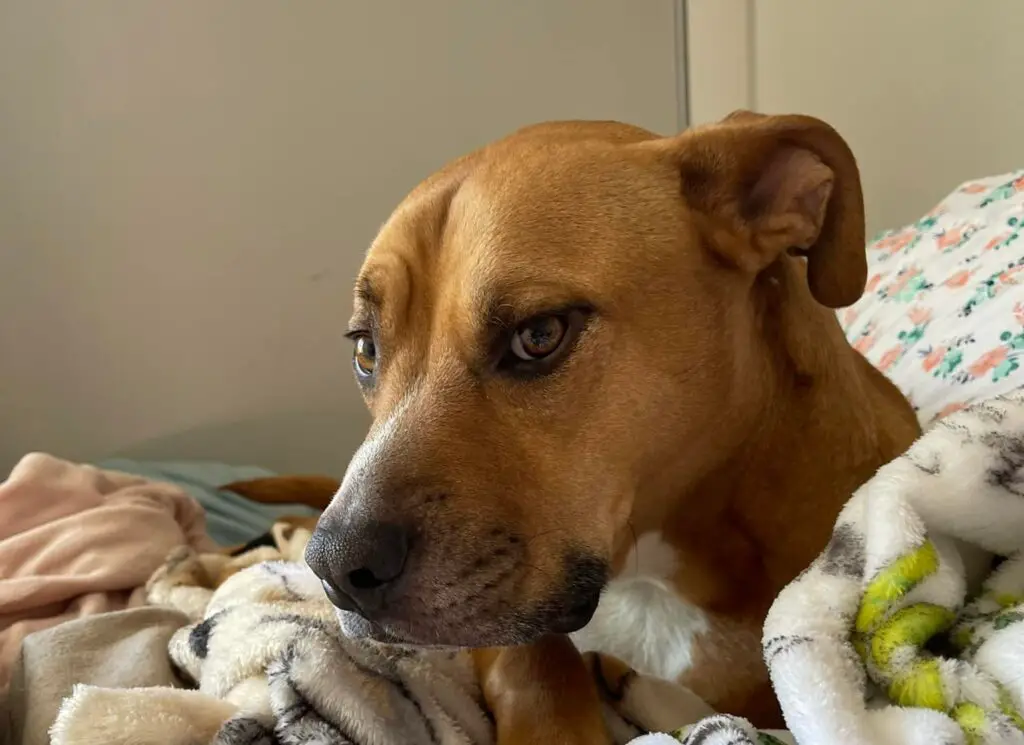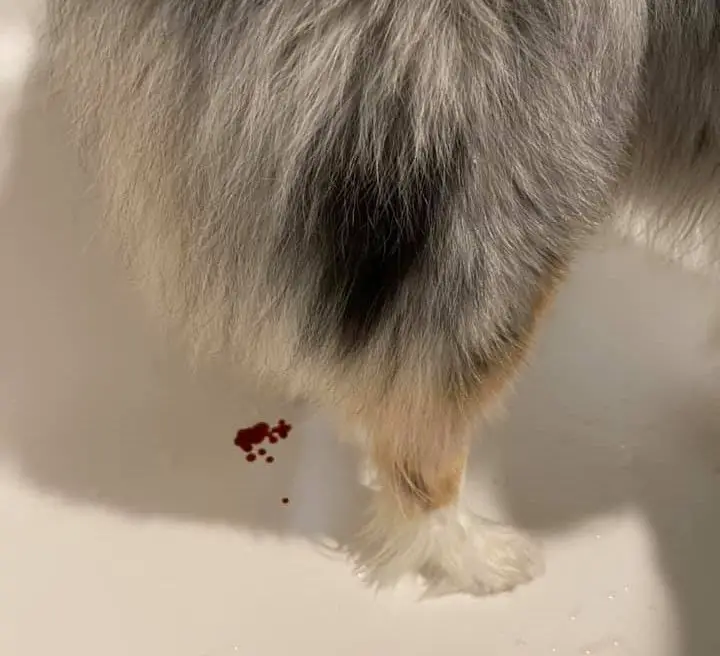Seeing blood in your dog’s stool will probably make you assume the worst. However, that is not always the case.
If your dog is pooping blood but otherwise seems healthy, you may be wondering what’s going on.
Key Takeaway
- Your dog may be pooping blood but acting fine due to various reasons ranging from dietary indiscretions, stress, and ingestion of foreign objects or toxins, to more serious conditions like gastrointestinal ulcers, infections, tumors, or underlying chronic diseases like liver or kidney disease.
- Bloody diarrhea in dogs is diagnosed through a combination of a thorough physical examination, detailed medical history, and specific diagnostic tests such as fecal examination, blood tests, imaging studies, and potentially an endoscopy.
- If your dog poops blood, it’s crucial to contact your vet immediately because this could be a sign of a serious health condition requiring prompt medical attention.
Why Is My Dog Pooping Blood But Acting Fine?

Observing your dog pooping blood but acting fine is a concerning situation and can be caused by various health issues. These range from minor problems like dietary indiscretion to serious conditions such as internal injuries or diseases.
Dietary Indiscretion
Dietary indiscretion is a common cause of bloody stools in dogs. This occurs when your pet consumes something it shouldn’t, such as garbage, spoiled food, or non-food items.
In my years as a vet, I’ve noticed that many dogs are prone to dietary indiscretion due to their curious nature. This can lead to gastrointestinal irritation, resulting in bloody stools. It’s important to monitor what your dog eats and to keep potential hazards out of reach.
Hemorrhagic Gastroenteritis (HGE)
Hemorrhagic Gastroenteritis (HGE) is a sudden and severe inflammation of the gastrointestinal tract. This condition causes bloody diarrhea and vomiting, yet many dogs with HGE remain active and alert. Prompt veterinary treatment with fluids and medications is essential for recovery.
Parasitic Infections
Parasites such as hookworms, whipworms, or giardia can cause bloody stools in dogs. Regular deworming and fecal checks are crucial to ensure your pet remains parasite-free.
In my practice, I’ve often seen dogs suffering from parasitic infections that display no other symptoms apart from bloody stools.
See: How Important Is Deworming For Dogs?
Gastrointestinal Ulcers
Gastrointestinal ulcers, which are sores in the lining of the stomach or intestines, can cause bloody stools. These ulcers might be due to medication side effects, disease, or stress.
As a vet, I’ve treated numerous dogs with gastrointestinal ulcers, and it’s crucial to identify and address the underlying cause to prevent recurrence.
Colitis
Colitis, or inflammation of the colon, often results in bloody diarrhea. Dogs with colitis might act perfectly normal apart from the change in their stools.
In my experience, colitis can often be managed with dietary changes and medication, but it’s crucial to seek veterinary advice to determine the best course of action.
Anal Gland Disorders

Anal gland disorders, like impactions or infections, can cause bloody stools. Regular check-ups can help detect and treat these issues early.
In my practice, I’ve found that maintaining a healthy diet and weight can help prevent anal gland issues in many dogs.
See: What To Expect After a Dog Enema (Answered!)
Coagulopathy (Bleeding Disorders)
Coagulopathies are disorders that affect the blood’s ability to clot. They can cause bloody stools among other symptoms. These conditions are usually inherited, but can also be acquired due to certain diseases or medications.
Trauma to the Digestive Tract
Physical injuries to the digestive tract, perhaps from a fight or accident, can result in bloody stools. If your dog has had a recent injury and is passing bloody stools, immediate veterinary attention is necessary.
Foreign Object Ingestion
Ingestion of foreign objects such as toys, bones, or fabric can irritate or even perforate the intestines, leading to bloody stools. As a vet, I’ve seen numerous cases where surgical intervention was required to remove the ingested foreign object and treat the resulting injuries.
Infectious Diseases (e.g., Parvovirus)

Infectious diseases like parvovirus can cause bloody diarrhea. Vaccination is the best prevention against many of these diseases. Despite acting normal, a dog with an infectious disease may still be very sick and should be seen by a vet immediately.
Medication Side Effects
Certain medications, especially non-steroidal anti-inflammatory drugs (NSAIDs), can cause gastrointestinal upset or ulcers that lead to bloody stools. Always administer medications as directed by your vet and monitor for any adverse effects.
Poisoning/Toxins
Ingesting toxic substances can result in bloody stools. This is a medical emergency and requires immediate veterinary attention. As a vet, I’ve treated dogs that have ingested a variety of toxins, from common household cleaners to toxic plants.
See: 10 Signs Your Dog Has Grape Poisoning
Stress-induced Gastrointestinal Upset
Stress can trigger gastrointestinal upset in dogs, resulting in bloody stools. This could be due to a change in environment, schedule, or other stressors. It’s important to minimize stress for your dog and seek veterinary advice if symptoms persist.
Tumors or Polyps in the Digestive System
Tumors or polyps in the digestive system can cause bloody stools in dogs. These growths can be benign (non-cancerous) or malignant (cancerous), and can occur anywhere in the gastrointestinal tract, including the esophagus, stomach, intestines, colon, and rectum.
Symptoms can vary based on the location and size of the tumor or polyp but often include bloody diarrhea, vomiting, weight loss, and changes in appetite. In my years as a vet, I’ve diagnosed and treated many dogs with gastrointestinal tumors or polyps.
Underlying Chronic Conditions (e.g., Liver or Kidney Disease)
Chronic conditions like liver or kidney disease can sometimes cause bloody stools in dogs. These diseases can affect the body’s normal functions, including digestion and waste elimination, leading to symptoms like bloody diarrhea.
For example, liver disease can result in poor clotting, resulting in bloody stools, while kidney disease can cause toxins to build up in the body, leading to gastrointestinal irritation and bloody stools.
How Is Bloody Diarrhea In Dogs Diagnosed
Bloody diarrhea in dogs is diagnosed through a combination of comprehensive physical examination, detailed medical history, and specific diagnostic tests.
Comprehensive Physical Examination
A thorough physical examination is the first step in diagnosing bloody diarrhea in dogs. This involves checking the dog’s overall health status, examining the abdomen for any abnormalities, and inspecting the rectal area.
The vet may also check the dog’s temperature, heart rate, and other vital signs to assess their general well-being.
Detailed Medical History
A detailed medical history can provide valuable information about the potential cause of the bloody diarrhea.
This includes questions about the dog’s diet, recent activities, medications, exposure to toxins, and any changes in behavior or appetite. As a vet, I’ve found that insightful answers from pet owners often lead me closer to a diagnosis.
Diagnostic Tests
Several diagnostic tests can help confirm the cause of bloody diarrhea in dogs. These might include:
Fecal Examination
A fecal examination is typically the first diagnostic test performed. It helps detect the presence of parasites, bacteria, or abnormal cells in the stool.
Blood Tests
Blood tests can reveal signs of infection, inflammation, anemia, or other systemic issues that could be causing the bloody diarrhea.
Imaging Studies
In some cases, imaging studies like X-rays or ultrasounds may be necessary to visualize the dog’s internal organs and identify any abnormalities, such as tumors or foreign objects.
Endoscopy
For certain cases, an endoscopy might be performed. This procedure allows the vet to visually examine the interior of the dog’s digestive tract using a special instrument called an endoscope.
What To Do If Your Dog Poops Blood
If your dog is pooping blood, the best course of action is to promptly consult a veterinarian who can diagnose the underlying cause and recommend appropriate treatment.
Contact Your Veterinarian
The moment you notice blood in your dog’s stool, it’s essential to contact your vet immediately. As a vet, I would advise you not to panic but to be prepared to provide as much detail as possible about the situation.
This could include when you first noticed the bloody stool, any changes in your dog’s behavior, diet or routine, and whether your dog has ingested anything unusual recently. These details can help your vet determine the urgency of the situation and the next steps to take says Wikipedia.
Collect a Stool Sample
If possible, collect a fresh stool sample in a clean, leak-proof container. This can be useful for your vet to perform tests that may help identify parasites, bacterial infections, or other potential causes of the bloody stools.
In my practice, I’ve found that stool samples can often provide crucial clues to diagnosing and treating a wide range of gastrointestinal issues.
Monitor Your Dog’s Behaviour
Even if your dog seems to be acting normal, keep a close eye on their behavior. Look for signs of distress, such as lethargy, loss of appetite, vomiting, or changes in behavior.
In my experience as a vet, I’ve seen many cases where a dog’s behavior provided critical information about their condition.
Consider Your Dog’s Diet
Dietary indiscretion, food intolerances, or sudden changes in diet can lead to bloody stools. Think about whether you’ve recently changed your dog’s food or if they could have gotten into something they shouldn’t have.
You’ll want to share this information with your vet, as it may influence their diagnostic process and treatment plan.
Be Prepared for Diagnostic Tests
Your vet may recommend diagnostic tests such as blood tests, imaging studies, or endoscopy to determine the cause of the bloody stools.
These tests can help identify conditions like gastrointestinal ulcers, tumors, or chronic diseases. Having been a vet for many years, I can attest to the importance of these diagnostic tools in identifying the root cause of the issue and devising an effective treatment plan.
Follow Your Vet’s Advice
Once your vet has identified the underlying cause, they will recommend a treatment plan. This could involve dietary changes, medication, surgery, or other treatments depending on the diagnosis.
It’s crucial to follow your vet’s advice closely to ensure your dog recovers fully.
How Long Do Dogs Recover From Bloody Diarrhea
The recovery time for dogs suffering from bloody diarrhea can vary widely, but with proper treatment, many dogs respond well and recover quickly.
Recovery times for dogs with bloody diarrhea depend on several factors, such as the underlying cause of the condition, the dog’s overall health, and the timeliness and effectiveness of the treatment provided.
If the cause is a minor dietary indiscretion or stress, bloody diarrhea may resolve within a few days once the irritant is removed or the stress is managed.
However, if the bloody diarrhea is due to a more serious condition, such as a gastrointestinal infection, parasite infestation, or a systemic disease, recovery might take longer.
In such cases, it could take anywhere from a few days to a few weeks for the dog to fully recover, depending on the severity of the condition and the dog’s response to treatment.
Can a Dog Poop Blood And Be OK?

Yes. It is possible for a dog to poop blood and be OK because the bloody stool could be caused by stress(moving to a new home) or dietary issues stemming from a sudden change of food.
This type of bloody stool presents itself as small bits on the surface of the stool (not mixed in) and goes away as soon as you adjust their diet (switch to bland).
It is concerning to see your pup suffering the symptom of pooping blood. Fortunately, it is possible for a dog to poop blood and still remain healthy in certain cases. Conditions such as stress, or dietary issues stemming from a sudden change of food can both cause blood in the stool.
This usually happens when the lower GI tract gets inflamed. While it isn’t detrimental, it is a symptom of ongoing issues that have to be addressed. A dog that poops blood but seems to be ok should be switched to a bland diet. Monitor their situation closely if it’s not improving or in case things go wrong.
If this persists when the upset has been dealt with, however, then it’s important to take the dog to visit their vet. An experienced professional can help to diagnose the cause and offer suitable treatments if necessary.
Will The Blood In Dog Stool Go Away On Its Own?
Whether the blood in a dog’s stool will go away on its own depends largely on the underlying cause of the bleeding.
In some cases, especially if the bleeding is due to a minor irritation or stress, the bloody stool might resolve on its own once the irritant is removed or the stress is managed.
For instance, if a change in diet caused the issue, reverting back to the old diet might resolve the problem. Similarly, if stress was the trigger, helping your dog relax and maintaining a calm environment could lead to improvement.
However, it’s important to note that bloody stools can also be a sign of more serious health issues, such as gastrointestinal ulcers, tumors, or parasitic infections. In these cases, the bleeding is unlikely to stop without proper medical treatment.
Even if the bloody stools do seem to resolve on their own, it’s still important to consult with a vet. The bleeding may have stopped, but the underlying cause could still be present and might lead to further complications down the line.
What Does Bright Red Blood In a Dog’s Stool Mean?

Bright red blood in a dog’s stool can mean gastrointestinal problems in a form of a foreign object in the digestive tract, parasites, infections in the intestines, and even cancerous growths. The way the dog handles the situation will tell you the severity of the situation.
If the bright red blood in a dog’s stool is caused by a foreign object such as a sharp bone chip or fish bones entering the digestive system, contact the veterinarian to be safe. They can puncture an intestine and cause bloody stool in dogs. This will be accompanied by stomach pain and discomfort.
If the bright red blood in a dog’s stool is caused by parasites, take your dog to the vet. Most parasites are fairly easy to treat. The vet will be able to determine the exact cause of the problem. Then, they will create a treatment plan accordingly. Parasites will often cause your dog to vomit, be lethargic, and have diarrhea.
Bright red blood in a dog stool can be also caused by an infection in the intestines. Infections are caused by a lot of factors including contaminated food, allergic reactions, and parasites. In this scenario, it is important to take your dog to the vet.
Cancerous growths can cause bloody stools. This symptom occurs because the cancerous abnormality affects the colon tissue of the dog’s intestine. It leads to irritation, inflammation, and bleeding. When viewed in a microscope, the cells from the cancerous growth appear misshapen and disorganized compared to healthy cells.
Can Stress Cause Blood In Dog Stool?

Stress can indeed be a factor causing blood in a dog’s stool, as it can lead to conditions like stress colitis or exacerbate underlying health issues.
Stress in dogs can manifest in various physical symptoms, one of which is bloody stools. This is often due to a condition known as stress colitis, an inflammation of the large intestine that results in diarrhea and, in some cases, blood in the stool.
Factors such as changes in environment, new additions to the family, boarding, or competitions can trigger stress in dogs, leading to such symptoms.
Furthermore, stress can exacerbate underlying health issues that may result in bloody stools. For instance, if a dog has a pre-existing gastrointestinal condition, periods of high stress might cause flare-ups, leading to blood in the stool.
It’s also worth noting that stress isn’t the only cause of bloody stools in dogs. Other potential causes could include dietary indiscretions, infections, ingestion of foreign objects, and more serious conditions like gastrointestinal ulcers or tumors.
Therefore, if you notice your dog has bloody stools, it’s important to consult with a vet promptly to determine the underlying cause and appropriate treatment.
What Do You Feed a Dog With Bloody Stool?
Feeding a dog with bloody stool often involves providing a bland diet, ensuring ample hydration, and introducing canine-specific probiotics to support gut health.
Provide a Bland Diet
One of the first steps when dealing with a dog with bloody stool is to provide a bland diet. This typically includes easily digestible foods like boiled chicken and white rice.
These foods are gentle on the stomach and can help soothe the digestive tract. As a vet, I’ve often recommended this approach to pet owners dealing with this issue. It’s important to introduce this new diet gradually to avoid further upsetting your dog’s stomach.
Ensure Ample Hydration
Hydration is crucial for a dog with bloody stool, as diarrhea can lead to dehydration. Make sure your dog has access to plenty of fresh water at all times.
In my practice, I have seen cases where dehydration exacerbated the condition, so it’s something you want to avoid.
Introduce Canine-Specific Probiotics
Canine-specific probiotics can be beneficial for dogs with bloody stools. These probiotics can help restore the balance of good bacteria in the gut, which can be disrupted by diarrhea.
In my experience, many dog owners have found success in alleviating their pet’s symptoms by incorporating high-potency probiotics into their dog’s diet.
Consider Activated Charcoal
Activated charcoal can be used as a natural remedy to bind toxins and remove them from the body, which can be particularly helpful if the bloody stool is due to ingestion of a harmful substance.
This is something I’ve suggested to pet owners in the past, but it should only be used under the guidance of a vet.
FAQs
Q: Should I be concerned if my dog is pooping blood?
A: Seeing blood in your dog’s stool can be alarming, but the level of concern may vary depending on the severity and duration of the bleeding, as well as your dog’s overall health. If your dog is pooping blood but otherwise acting fine, it may not be an immediate cause for concern. However, it is always recommended to consult your veterinarian to rule out any underlying health issues and to ensure proper treatment.
Q: When should I take my dog to the vet if I notice blood in their stool?
A: It is generally advisable to take your dog to the vet if you notice blood in their stool, regardless of whether they are acting fine or not. If the bleeding is continuous, severe, or accompanied by other troubling symptoms such as vomiting, diarrhea, lethargy, or loss of appetite, it is important to seek immediate veterinary attention. Your veterinarian will be able to evaluate your dog and determine the underlying cause of the blood in the stool.
Q: Can a dog’s diet cause blood in the stool?
A: Yes, a dog’s diet can sometimes cause blood in the stool. Sudden changes in diet, dietary indiscretion (such as eating spoiled or toxic food), or feeding certain foods that do not agree with your dog’s digestive system can lead to gastrointestinal upset and bloody stool. However, there can be other underlying causes as well, so it is important to consult your veterinarian for a proper diagnosis and guidance on the appropriate diet for your dog.
Q: Is blood in my dog’s stool always a sign of a serious condition?
A: While blood in your dog’s stool can be a cause for concern, it does not necessarily indicate a serious condition. Sometimes, minor issues such as dietary indiscretion, stress, or dietary changes can cause temporary blood in the stool. However, it is always recommended to consult your veterinarian to determine the underlying cause and ensure appropriate treatment, especially if the bleeding persists or is accompanied by other concerning symptoms.
Q: What can cause a dog to have tarry stool or tarry blood in their stool?
A: Tarry stool or tarry blood in a dog’s stool can be indicative of digested blood in the gastrointestinal tract. This can occur due to bleeding in the upper digestive tract, such as the stomach or small intestine. Possible causes include gastrointestinal ulcers, ingestion of certain medications, liver or kidney disease, and ingestion of toxic substances. It is important to seek veterinary attention if you notice tarry stool or tarry blood to determine the underlying cause and provide appropriate treatment.
Q: Can bacterial infections cause blood in a dog’s stool?
A: Yes, bacterial infections can be a common cause of blood in a dog’s stool. Bacterial infections can lead to inflammation and damage to the gastrointestinal tract, resulting in bleeding. Common bacterial infections that can cause blood in the stool include Salmonella, Campylobacter, and certain types of E. coli. If you suspect a bacterial infection, it is important to consult your veterinarian for proper diagnosis and treatment.
Q: Is vomiting always associated with blood in a dog’s stool?
A: No, vomiting is not always associated with blood in a dog’s stool. While vomiting and blood in the stool can both be signs of gastrointestinal issues, they do not always occur together. It is possible for a dog to have blood in their stool without vomiting, and vice versa. If you notice either symptom, it is advisable to consult your veterinarian to determine the underlying cause and appropriate treatment.
Conclusion and final thoughts
In conclusion, finding blood in your dog’s stool can be alarming and concerning. However, with proper understanding and awareness, it can be managed effectively.
This blog post explored the potential causes of bloody stool in dogs, such as dietary changes or underlying health issues like parasites or infections.




